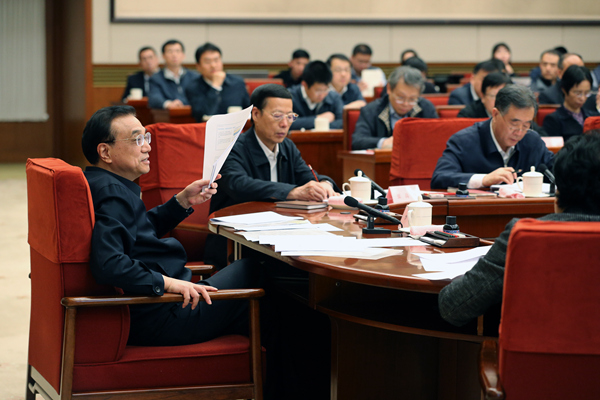
Premier Li Keqiang speaks at a seminar on the afternoon of Jan 22 at the Zhongnanhai leadership compound in Beijing. The seminar was held to solicit suggestions for the draft of this year’s Government Work Report from scholars, experts and entrepreneurs.[Photo/China Daily]
China will properly manage the timing, pace and intensity of macroeconomic controls to achieve higher quality growth, Premier Li Keqiang said.
Premier Li made the remark while chairing a seminar on Jan 22 afternoon at the Zhongnanhai leadership compound that solicited suggestions for the draft of this year’s Government Work Report. He heard from seven representatives of academics as well as State-owned and private businesses.
Suggestions were given to the Premier on building a more comprehensive innovation platform, unleashing the consumption potential of small cities while pushing forward with new urbanization, accelerating mixed-ownership reform of State-owned enterprises, stronger reform measures against the spillover effect of the world economy and better protections for private investment.
The Chinese economy remained in good health in 2017, Premier Li said, with better-than-expected growth, structural reform showing results and improved growth quality.
He said challenges and risks still lie ahead and the government will implement the spirit of the 19th CPC National Congress while sticking to the guidance of Xi Jinping Thought on Socialism with Chinese Characteristics for a New Era to realize better quality growth.
“With the Chinese economy expanding in scale, new changes and features of the country’s economy keep emerging, while its complexity is also increasing. This has laid out new requirements for social governance and economic guidance,” Premier Li said.
“More targeted policymaking is required to boost the vitality of the microeconomy and of market entities and these are important for the sound growth of the macroeconomy,” he said.
“Governments at all levels will spare no efforts to create an inviting business environment, particularly for private companies, to boost vitality,” he said.
Hailing suggestions from the representatives is a “gold key” to improve government activities, Premier Li said, urging the government at all levels to listen more to the public and the market, carry out more field research with local businesses and further innovate to reduce institutional costs.
Zhou Qiren, a professor of the National School of Development at Peking University who attended the meeting on Jan 22, suggested that reform needs to be intensified to see tangible results, as the scale of China’s economy now is no comparison with that of the past.
“Discussion at the meeting has been quite candid, and I feel that other representatives have been quite straightforward with their suggestions on the draft of the report,” said Xing Ziqiang, an economist from Morgan Stanley China who attended for the first time. He suggested that more focus should be placed on the consumption potential of China’s third-tier cities and lower.
Figures from the National Bureau of Statistics show that the world’s second-largest economy expanded by 6.9 percent year-on-year in 2017, the first acceleration in annual growth in seven years. New growth drivers, such as consumption, are emerging strong, while the service industry is consolidating its lead.
